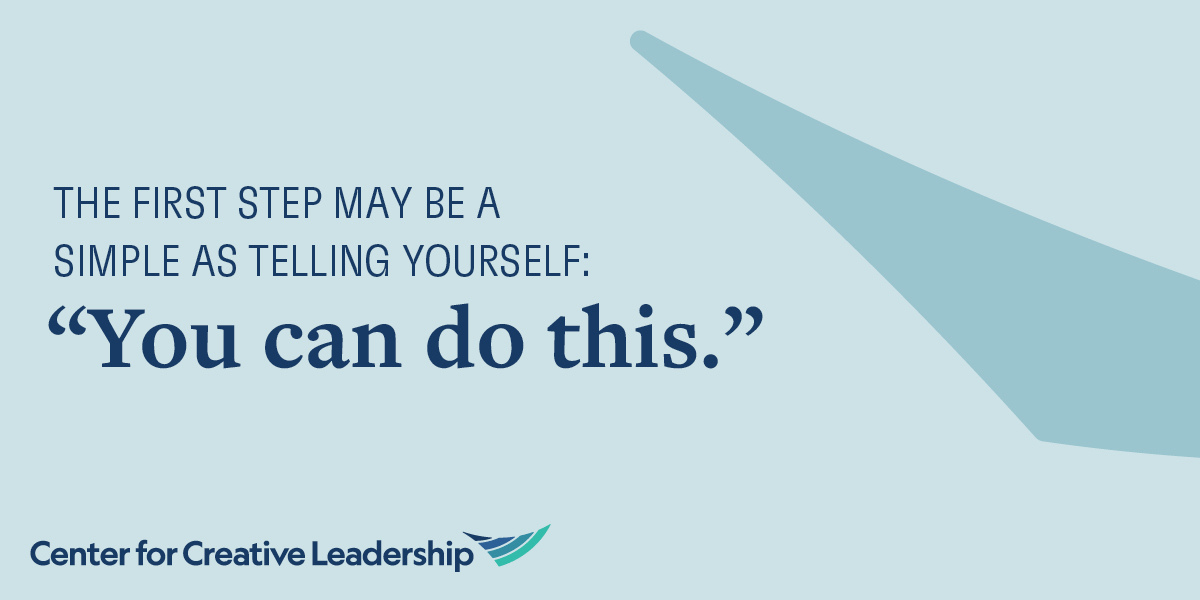Your Self-Talk Matters
Because of economic uncertainty, competitive pressures, and the fact that leading a hybrid workforce effectively requires strong emotional intelligence and communication skills, leadership roles are more challenging now than ever. People look to their leaders for guidance on what to do and how to do it.
Not only are you responsible for making the tough decisions, but all eyes are on you. You have a responsibility to be a good role model, including managing your own reactions. But dealing with uncertainty can be difficult, and as a human, you’re subject to the same feelings of stress and worry as your team.
So what can you do, as a leader, in those challenging situations? It might sound trivial, but one small step to take: Consider how you talk to yourself.
Your self-talk can impact both how you handle stress, and how others see you as a leader.
How to Harness the Power of Positive Self-Talk
4 Tips for Leaders
Research shows the incredible power of positive self-talk. So whether you’re speaking out loud, thinking in your head, or just jotting things down in a journal, follow these guidelines to harness the power of positive self-talk to improve your mental health and others’ perceptions of your leadership skill.
1. Shift from “me, myself, and I” to “you/your.”
Studies have found that people who think of themselves in the “second person” (e.g., “You can do this!”) or talk to themselves using their own name (e.g., “Great job, Cathleen!”) instead of in the “first-person” (e.g., “I’m doing a great job”) fared better during stressful situations. Specifically, people who were randomly assigned to practice second-person self-talk:
- Recovered quicker from social stressors;
- Made better first impressions, in others’ eyes;
- Performed better on a public speaking challenge; and
- Saw daunting tasks as challenges rather than threats.
Our researchers have found similar results. As noted in our research report, we looked at how leaders talk to themselves and found that leaders who used second-person “you” pronouns in their inner dialogue were rated as less likely to derail, according to their peers. On the flip side, leaders who used first-person “I” pronouns were given lower performance ratings by their bosses and higher ratings for likelihood of derailment by their peers.
This pronoun trick proves the power of positive self-talk: Simply talking to yourself in the second person causes you to take a step back and see things more objectively. It offers a nearly effortless way to regulate your emotions and harness self-control — both of which are especially important during challenging times.
2. Talk to yourself like you would to your closest friend.
To understand the power of positive self-talk, in another study our researchers examined nearly 200 self-addressed, anonymized letters that senior executives wrote to themselves as part of their development. They then classified the self-talk as either:
- Constructive: Comments that were thoughtful, substantive, motivational, insightful, positive, and self-reflective we classified as constructive self-talk.
- Dysfunctional: Comments that were highly critical or focused on obstacles and negative aspects of challenging situations were classified as dysfunctional.
We found that leaders who used dysfunctional self-talk and swore at themselves in these letters were rated by others as having lower creativity and originality scores — even though other people never saw the letters! But this make sense: Negative, dysfunctional self-talk (including swearing at yourself) reflects a leader who is struggling to embrace change, see setbacks as a learning opportunity, and learn lessons from adversity and hardships.
In contrast, the power of positive self-talk was revealed because researchers found that constructive self-talk was positively related to increased creativity and leadership skill, along with decreased job strain. In short, your words matter, even if you’re the only one who hears them!
So, talk to yourself the way you would to a friend. If you prefer kindness in the workplace, and wouldn’t want to work for someone who yelled obscenities at you, then don’t use them about yourself, either — not even in private. Be kind to yourself!
3. Watch for distorted thought patterns.
We like to think that our thoughts and feelings are objective reflections of reality, but it’s not that simple. Psychologists have long established that our thoughts can get distorted, especially during times of stress. Common examples of distorted thought patterns include:
- Black and white thinking — The tendency to view a situation in either/or, all-or-nothing terms. (“If they cancel this project, then nothing I’ve done here matters.”)
- Catastrophizing — Immediately jumping to the worst-case scenario. (“He says he has bad news; I bet we’re all going to get fired!”)
- Overgeneralizing — Taking an incident and generalizing too broadly. (“She never listens to my ideas.” or “He always rolls his eyes at me.”)
Some researchers believe these “cognitive distortions” may be a survival mechanism to help people cope with prolonged stress. After all, worst-case scenario thinking might help you in surviving the worst-case scenario.
But these distorted thought patterns can become habitual and lead to faulty decision-making, increased anxiety, and high levels of stress and rumination. In fact, the same CCL study found that leaders who reported more frequent cognitive distortions were also more likely to experience burnout.
The good news is, once you’re aware of these distortions, you can learn to recognize them for what they are and not let them lead you astray.
Our study of leaders’ cognitive distortions found that using emotion regulation strategies, such as taking a step back from our thoughts — or considering other perspectives — seems to act as a buffer that prevents cognitive distortions from contributing to burnout. So to reduce your distorted thought patterns, consider mindful leadership practices and explore strategies for dealing with uncertainty and anxiety.
Access Our Webinar!
Watch our webinar, How to Promote Wellbeing at Work, and learn how to build a workplace culture that supports and promotes wellbeing for all employees.
4. Secure your own mask before assisting others.
Focusing on your own inner dialogue might feel selfish or inconsequential, but it actually isn’t. Remember what they say on commercial airlines about what to do in case of an emergency: Stay calm, and secure your own mask before assisting others.
This advice is sound, because you can’t help others if you’re not in a good place yourself. So don’t subvert your own needs. Compassionate leadership toward others actually starts with the ability to show self-compassion, so start by leading yourself — with the power of positive self-talk.
Ready to Take the Next Step?
Our array of research-backed, world-class leadership programs equip individuals to harness the power of positive self-talk and build their overall wellbeing, so that no matter their level in the organization, they lead others — and themselves — more effectively.










